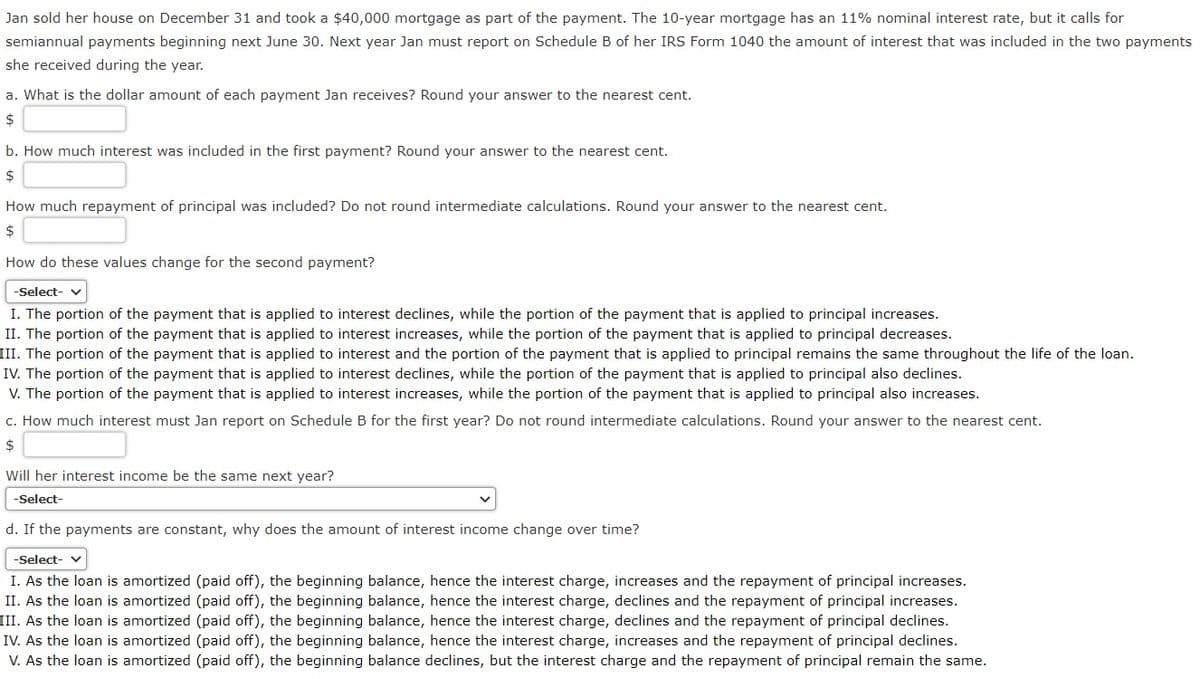Jan sold her house on December 31 and took a $40,000 mortgage as part of the payment. The 10-year mortgage has an 11% nominal interest rate, but it calls for semiannual payments beginning next June 30. Next year Jan must report on Schedule B of her IRS Form 1040 the amount of interest that was included in the two payments she received during the year. a. What is the dollar amount of each payment Jan receives? Round your answer to the nearest cent. b. How much interest was included in the first payment? Round your answer to the nearest cent. How much repayment of principal was included? Do not round intermediate calculations. Round your answer to the nearest cent. How do these values change for the second payment? -Select- v I. The portion of the payment that is applied to interest declines, while the portion of the payment that is applied to principal increases. II. The portion of the payment that is applied to interest increases, while the portion of the payment that is applied to principal decreases. III. The portion of the payment that is applied to interest and the portion of the payment that is applied to principal remains the same throughout the life of the loan. IV. The portion of the payment that is applied to interest declines, while the portion of the payment that is applied to principal also declines. V. The portion of the payment that is applied to interest increases, while the portion of the payment that is applied to principal also increases. c. How much interest must Jan report on Schedule B for the first year? Do not round intermediate calculations. Round your answer to the nearest cent. 2$ Will her interest income be the same next year? -Select- d. If the payments are constant, why does the amount of interest income change over time? -Select- v I. As the loan is amortized (paid off), the beginning balance, hence the interest charge, increases and the repayment of principal increases. II. As the loan is amortized (paid off), the beginning balance, hence the interest charge, declines and the repayment of principal increases. III. As the loan is amortized (paid off), the beginning balance, hence the interest charge, declines and the repayment of principal declines. IV. As the loan is amortized (paid off), the beginning balance, hence the interest charge, increases and the repayment of principal declines. V. As the loan is amortized (paid off), the beginning balance declines, but the interest charge and the repayment of principal remain the same.
Please show working
This is a split question. See attchment for full question. Please answer all of c and d
Jan sold her house on December 31 and took a $40,000 mortgage as part of the payment. The 10-year mortgage has an 11% nominal interest rate, but it calls for semiannual payments beginning next June 30. Next year Jan must report on Schedule B of her IRS Form 1040 the amount of interest that was included in the two payments she received during the year.
c1. How much interest must Jan report on Schedule B for the first year? Do not round intermediate calculations. Round your answer to the nearest cent. ______________
c2. Will her interest income be the same next year?
-Select- the correct choice
- Her interest income will increase in each successive year.
- Her interest income will remain the same in each successive year.
- She will not receive interest income, only a return of capital.
- Her interest income will decline in each successive year.
- She will receive interest only when the mortgage is paid off in 10 years.Item 6
d. If the payments are constant, why does the amount of interest income change over time?
-Select-the correct choice
- As the loan is amortized (paid off), the beginning balance, hence the interest charge, increases and the repayment of principal increases.
- As the loan is amortized (paid off), the beginning balance, hence the interest charge, declines and the repayment of principal increases.
- As the loan is amortized (paid off), the beginning balance, hence the interest charge, declines and the repayment of principal declines.
- As the loan is amortized (paid off), the beginning balance, hence the interest charge, increases and the repayment of principal declines.
- As the loan is amortized (paid off), the beginning balance declines, but the interest charge and the repayment of principal remain the same.

Trending now
This is a popular solution!
Step by step
Solved in 3 steps with 2 images








